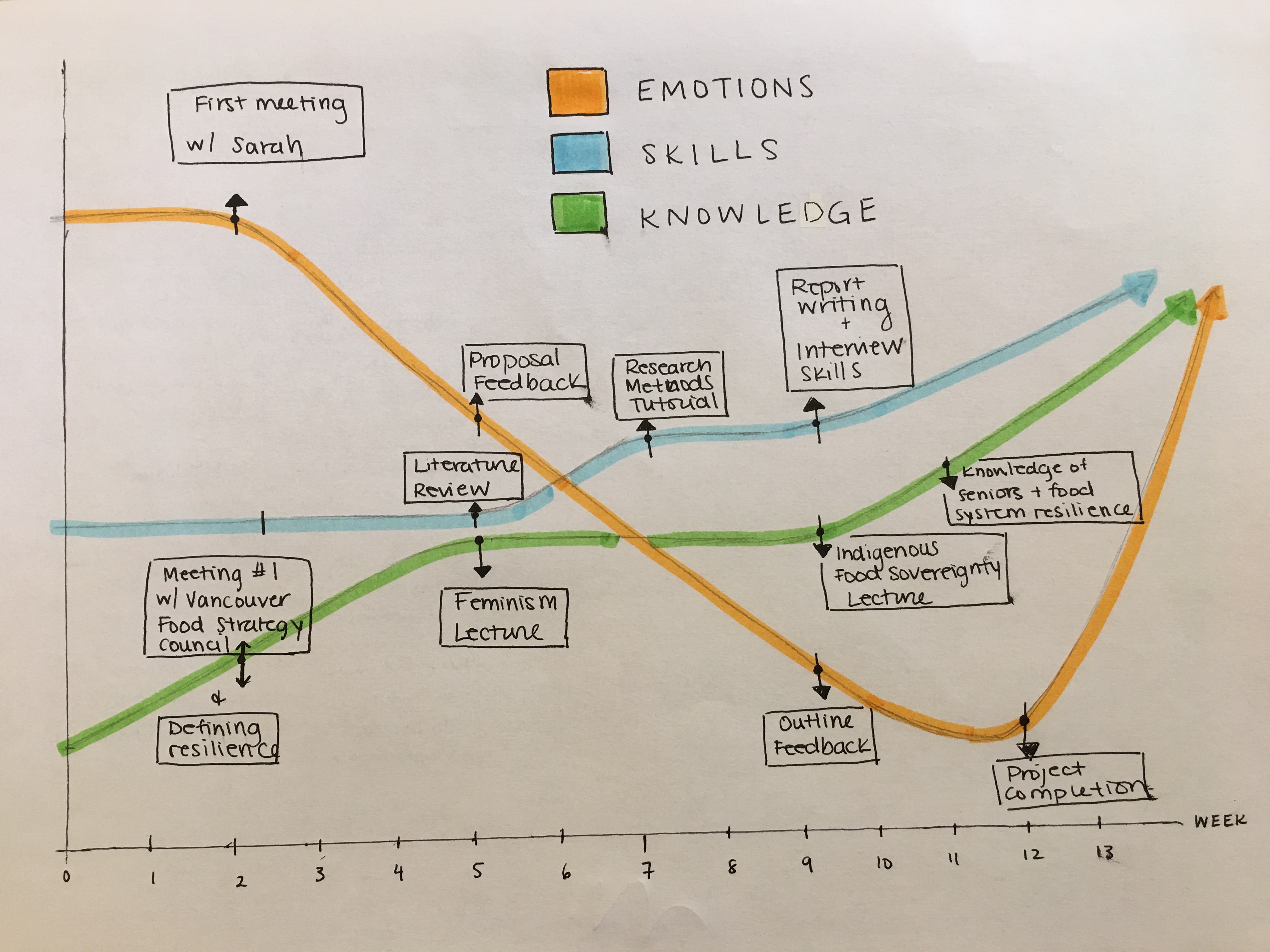Since we last spoke…
Since our last update, we managed to finish writing our first draft of the survey; we then piloted the survey with an amazing group of seniors at 411 Seniors’ Centre in Vancouver. Their feedback on the survey has been incredibly helpful as we are currently in the process of writing our revised survey and final report.
Moment of Significant Change
What?
As mentioned earlier, we were given the opportunity to meet with some seniors at 411 Seniors’ Centre; the discussion around the effectiveness of our pilot survey was rewarding. Our focus group at the centre evoked plenty of meaningful discussion and helped us gain a better perspective on some of the individual concerns.
We noticed the group discussion expanded beyond just evaluating the survey implying that perhaps the survey questions might increase awareness of disaster preparedness. For example, we noticed that the questions included in our survey prompted the group to consider the scope of their ability to help during a disaster, and began a discussion regarding the methods they could use or have used in the past to ensure the wellbeing of the others in their community. The group also proposed some concrete changes to improve the survey including changing the survey response scales to a numeric system of 1-5 and the incorporation of biking as a means for food access.
So What?
After having a dramatic decrease in team morale this term (See Blog 3), this experience at 411 Seniors’ Centre helped rekindle the excitement felt during Week 1 of this project. The process of literature selection, literature review and finally, survey design was challenging and time-consuming; admittedly, we were feeling a bit anxious to take our survey out into the community. This nervousness and anxiety disappeared quickly as we saw how positively the focus group received the survey. Their questions and comments surrounded the important criteria (Table 1) we hoped to evaluate using this survey as well as overarching themes or concepts that we did not ask about directly. As well, we were pleased to see how appreciative they were for being included in our pilot survey, and this also contributed to our positive experience.
These responses helped to reinforce that the tool we produced actually asked the right questions and helped to raise awareness of our topic. These results helped to drastically improve group outlook on the project and came at the perfect moment in the semester. Our pilot study was overall an extremely positive experience.
Table 1. Criteria for evaluating resilience
| Concept | Criteria | Indicators |
| Resilience: A food system perspective in resilience planning will prioritize the right strategies to ensure that the food system returns to normal as quickly as possible (Zeuli, 2017). |
Communication preferences |
Prefered communication methods
Past communication methods Do they feel informed Relevance of government recommendations |
|
Food access |
Physical disability
How and where they currently get food |
|
|
Ease of Recovery |
Financial stability
Disaster insurance Social support Emergency plan Personal concerns |
Now What?
We hope to use this newfound excitement to motivate us in the last week ensuring our final products meet the highest standards. We can already observe this motivating force in our collaboration efforts as we enter the initial stages of report writing, infographic creation and survey revision. We could also observe the positive benefits of our efforts in the debrief following the survey pilot. We made a streamlined set of deadlines that would work around everyones’ schedules to hopefully minimize stress over the final week but also allowing for sufficient time to revise as necessary.
From meeting with the seniors, it is clear to us that the survey encouraged thinking about their own personal resilience as well as the resilience of the City of Vancouver; we hoped for this outcome in the early stages of our survey-writing. This demonstrates how effective our survey could be if implemented on a larger scale. This process of using representatives of a particular community in the city of Vancouver is one way through which this survey can report on, and contribute to asset-based community development. Through discussing issues with individuals, especially those who may be underrepresented otherwise helps to better understand the mechanisms a community may already employ and use city resources to work synergistically toward improving our collective food security. As well, consideration of specific groups of individuals, such as the seniors in our study, is one example of how this survey utilized a food justice lens; our process could be mimicked for similar groups that may also be underrepresented in food systems discussions. We hope that our survey instrument can be implemented by a future LFS 350 group.
Further studies using our survey could be useful for collecting data on the public perceptions and readiness of citizens of Vancouver as well as provide an incentive for individuals to reflect on their own preparedness.

